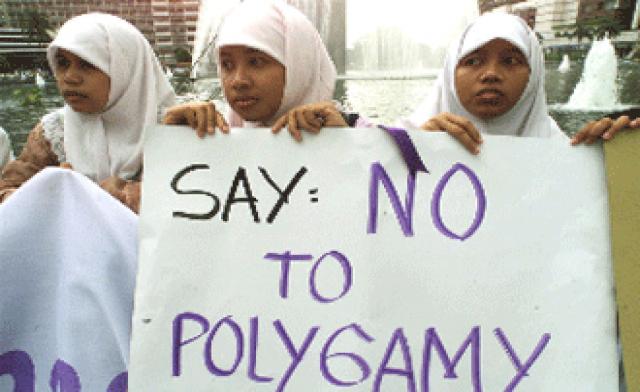A few months ago, while reviewing one of my friend’s profiles on Facebook, I was surprised to see the amount of discussion that Shari’ah rulings regarding marriage provoke in the West.
My friend, an orthodox Sunni Muslim and avid follower of the Hanbali school, had commented in a picture from 2010 that depicted Malaysian women protesting against the legality of polygamy. The picture, while not shocking for many of us, seemed to bother a number of commentators across the globe. Some people had qualified these women as “ignorant” because of course polygamy is a Muslim man’s default right… while others qualified polygamy as “every Muslim woman’s right.” Not surprisingly for me, the fact that the women depicted in the picture were not Arab seemed (to some of those commenting) to indicate that Southeast Asian Muslim women were somehow misinformed in their challenge to one of the “basic” precepts of Islam.
This story crossed my mind recently as I read an article regarding polygamy that caught my attention. The article, posted in BBC News, discusses polygamy and how Muslim women are “victims” in such an arrangement. The post introduced the topic through Zabina Shahian’s story. Shahian’s marriage has recently become public because of her husband’s political position. UK politician Pervez Choudhry, who never mentioned to Shahian that he already had one wife, has recently been convicted for bigamy. Shahian’s experience is not a happy one by any means. The article mentions the fact that a lot of Muslim women in South Asian communities are victims of polygamy without knowing it. In addition, Shahian explains that there is a deep stigma attached to fighting polygamy in the community or simply saying “no” to it.
Just as the people commenting on the Facebook picture seemed to have very strong opinions, this article presents very strong stands against polygamy, perhaps because it is illegal in the UK, just as it is in other countries such as Canada. Nonetheless, polygamy or plural marriages exists in many forms. For instance, in Canada, polygamy is not only discussed in terms of Islam, but also in terms of the fundamentalist Mormon polygamous communities of Bountiful, BC. In addition, polyamorous relationships are becoming increasingly common in the West. However, in many cases, we, as part of Western societies, do not know how to approach it. While it seems easier to discuss polygamy in religious terms and criticize it for the negative effects that has had on members of particular communities (here and here), it is hard to discuss the polygamy experience as it relates to particular personal experiences (either negative or positive).
There are a lot of articles out there, for or against polygamy, that aim to treat relationships all in bulk. Similarly, there are some articles where Muslim women themselves seem troubled by polygamy, as I wrote in my personal blog a few months ago. Nonetheless, generalizations can sometimes help to make things more difficult for those who prefer polygamy, polyamory or “less normative” forms of monogamy (i.e. LGTBQ marriage). Speaking in terms of Muslim communities, widespread discussions on anything other than monogamy and polygyny (one man-up to 4 wives) are perhaps still far away. Nonetheless, the reality of things is that just as marriage arrangements change and fiqh rules are challenged, for example by Muslim women who marry non-Muslims, individuals will continue to develop particular marital practices.
In terms of law, such as bans of polygamy in the Western world, it would seem that sometimes such a stands against polygamy are more about protecting other value systems (i.e. secular or religious ones) even when they are presented under the banner of women’s wellbeing. While it is certainly true that polygamy and polyamory can have excruciating effects on personal relationships and women’s status within a marriage, monogamy has not guaranteed women’s safety or rights either, nor has it eradicated domestic violence or prevented men and women from engaging in extra-marital relationships, as we have seen in centuries of such a practice.
At the end of the day, for me the BBC article made me think of the earlier Facebook discussion in that it reminded me not only of the disconnect between Western media and Muslim discussions on issues such as polygamy; but it also presented an example of the way in which we, as either media or part of Muslim communities, continue to treat polygamist relationships as a “bulk” with little acknowledgement of the context and implications. Although in Shahian’s case she was denied the right to make an informed choice about polygamy, I think it is important for the Western media and our Muslim communities to acknowledge the different ways in which women relate, engage, endorse, resist or reject polygamy contextually.



